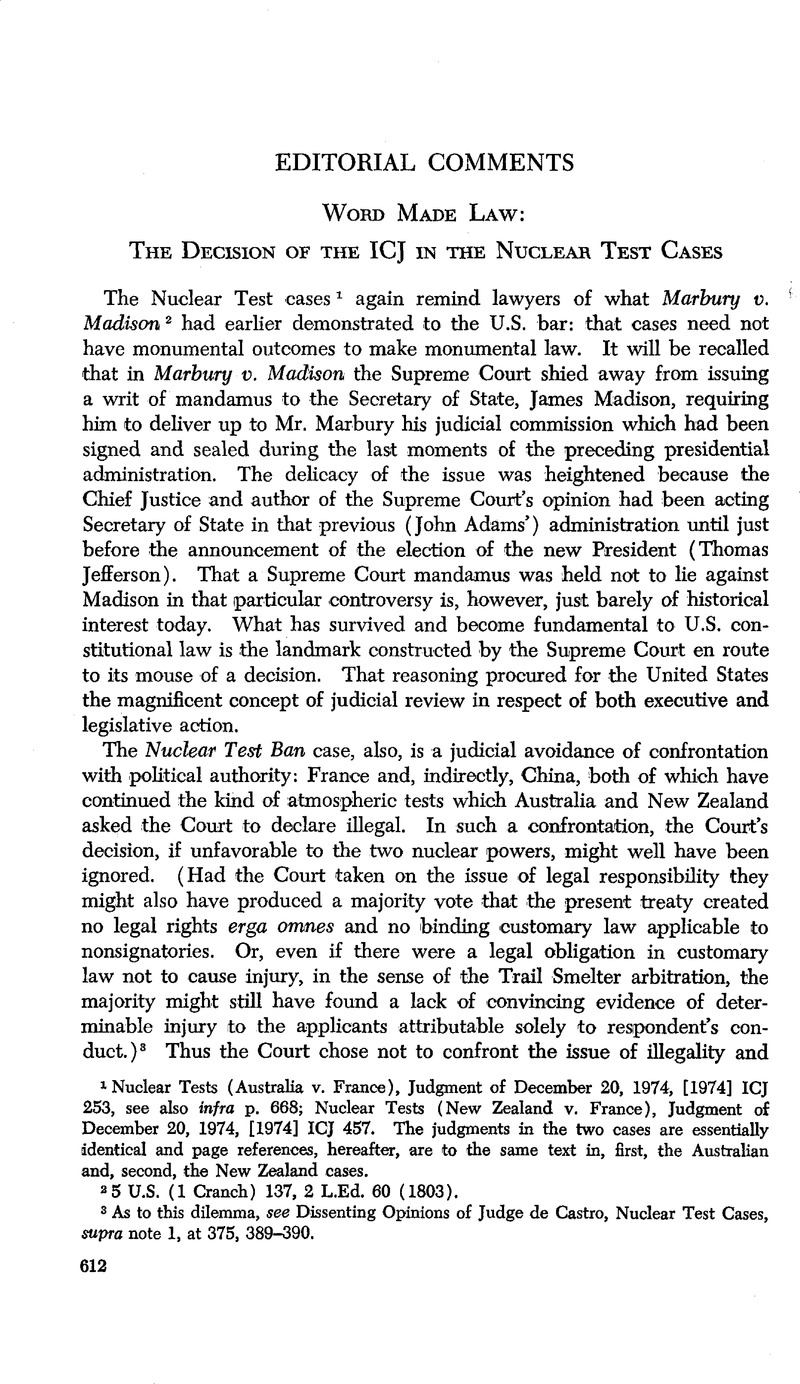Article contents
Word Made Law: The Decision of the ICJ in the Nuclear Test Cases
Published online by Cambridge University Press: 28 March 2017
Abstract

- Type
- Editorial Comments
- Information
- Copyright
- Copyright © American Society of International Law 1975
References
1 Nuclear Tests (Australia v. France), Judgment of December 20, 1974, [1974] ICJ 253, see also infra p. 668; Nuclear Tests (New Zealand v. France), Judgment of December 20, 1974, [1974] ICJ 457. The judgments in the two cases are essentially identical and page references, hereafter, are to the same text in, first, the Australian and, second, the New Zealand cases.
2 5 U.S. (1 Cranch) 137, 2 L.Ed. 60 (1803).
3 As to this dilemma, see Dissenting Opinions of Judge de Castro, Nuclear Test Cases, supra note 1, at 375, 389-390.
4 Northern Cameroons Case (Cameroon v. United Kingdom) [1963] ICJ 15; South West Africa Case, Second Phase, (Ethiopa v. South Africa; Liberia v. South Africa) [1966] ICJ 6; Barcelona Traction, Light and Power Company, Limited Case, Second Phase, (Belgium v. Spain) [1970] ICJ 3. The Lachs Court, however, is notably different from its predecessor in that the Nuclear Test Cases, while technically not decided in the applicants’ or respondent’s favor, provide a declaration of law that essentially meets the request of the former. Moreover, the decision not to decide on the substantive merits was in the Nuclear Test Cases made early in the proceedings, thereby avoiding the frustration created by the earlier cases.
5 Joint Dissenting Opinions of Judges Onyeama, Dillard, Jiménez de Aréchaga, and Sir Humphrey Waldock, Nuclear Test Cases, supra note 1, at 312 and 494; also, Dissenting Opinions of Judge De Castro, 372 and 524.
6 Dissenting Opinions of Judge Sir Garfield Barwick, supra note 1, at 391 and 525.
7 Id. 319-24; 502-06.
8 Id. 259-60; 463.
9 Id. 267-68:472-73.
10 Id. 266 and 470.
11 Id. 267 and 471; 276 and 472.
12 Garner, James W., The International Binding Force of Unilateral Oral Declarations, 27 AJIL 493 (1933)CrossRefGoogle Scholar.
13 Denmark v. Norway, [1933] PCIJ, ser. A/B, No. 53; 3 Hudson, World Court Reports 148 (1938).
14 This distinguishes a unilateral binding undertaking from a formal agreement made between several parties, which, according to Article 102 of the Charter of the United Nations, must be registered with the UN Secretariat to be invoked by a party to the treaty. The proviso is obviously inapplicable to unilateral undertakings where the invoking beneficiary is never a “party.”
15 It will be recalled that Egypt made a unilateral declaration, intended to create legal obligations, upon the reopening of the Suez Canal in 1957. See Egyptian Declaration of April 24, 1957, annexed to letter to the Secretary-General of the United Nations from the Egyptian Minister for Foreign Affairs of the same date, UN Doc. A/3576, S/3818 (1957).
16 Francs, Thomas M. and Weisband, Edward, Word Politics: Verbal Strategy Among The Superpowers 120-21 (1971)Google Scholar.
17 Nuclear Test Cases, supra note 1, at 269; 474. For the general proposition in U.S. law, see: Burr v. Adam Eidemiller, Inc., 386 Pa. 416, 126 A.2d 403 (1956); Garratt v. Dailey, 49 Wash. 2d 499, 304 P.2d 681 (1956); Jost v. Dairyland Power Co-op., 45 Wis. 2d 164, 172 N.W.2d 647 (1969).
18 1A A. L. Corbin, Contracts 188 (1963).
19 Central London P. Trust v. High Trees House [1947] 1 K.B. 130. Here a tenant continued to occupy and do business in a premises, relying on the landlord’s promise to reduce the rent. Martin v. Meles 179 Mass 114, 60 N.E. 397 (1901). In Re Estate of Griswold 113 Neb. 256, 202 N.W. 609, 38 A.L.R. 858 (1925).
20 Restatement of Contracts, §90 (1932).
21 Corbin, supra note 18, at 193.
22 Id. 215-16.
23 In Re Griswold, note 19 supra.
24 Nuclear Test Cases supra note 1, at 269, 473-74.
25 Id. 272, 477.
26 For the domestic counterpart rule, see Seavey, , Reliance Upon Gratuitous Promises or Other Conduct, 64 Harv. L. Rev. 913 (1951)CrossRefGoogle Scholar. Seavey is of the view that a promisor may withdraw his promise by timely notification to the promisee.
27 The New York Times, April 10, 1975, at 1.
28 See Article 46 of the Vienna Convention on the Law of Treaties, UN Doc. A/CONF.39/27 (1969), 63 AJIL 875, 890 (1969).
- 17
- Cited by


